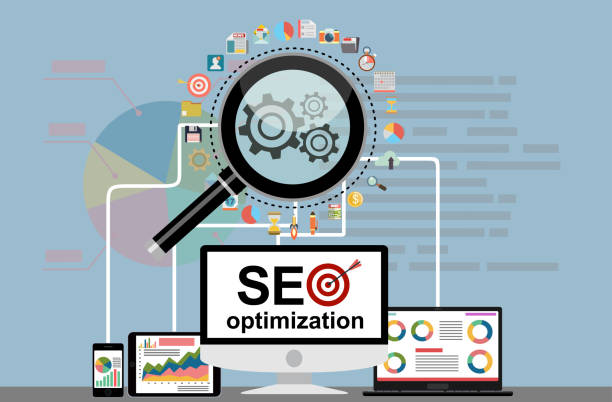What is SEO and why is it important?

What is SEO and Why is it Important?
#SEO (Search Engine Optimization) is a process carried out with the aim of improving your website’s ranking in search engine results like Google.
When a user searches for a phrase on Google, Google displays websites that offer the most relevant and authoritative answers to the user’s query at the top ranks.
SEO helps you optimize your website for search engines to increase the chance of being seen and attracting organic (free) traffic.
The importance of SEO in today’s world is immense.
Given that most users rely on search engines to find information, products, and services, having a high ranking in search results can lead to a significant increase in website visitors, higher sales, and ultimately, business growth.
Investing in SEO is a long-term investment that can bring you sustainable and remarkable results.
Without SEO, your website will be lost among millions of other websites, and you will miss the opportunity to be seen.
SEO is an ongoing process and requires continuous effort and follow-up.
In summary, SEO means optimizing your site so that search engines (especially Google) show your site higher in search results.
The higher your ranking, the more people will see your site, which means more traffic, more customers, and consequently more profit for your business.
Wikipedia also provides useful information in this regard.
Does your current e-commerce website design not generate the sales you expect?
RasaWeb specializes in professional e-commerce website design!
✅ An attractive and user-friendly website aimed at increasing sales
✅ High speed and security for an ideal shopping experience⚡ Get a free consultation on online store design with RasaWeb!
Key SEO Concepts: Understanding Basic Terminology

Key SEO Concepts: Understanding Basic Terminology
To start with SEO, it’s essential to become familiar with some key concepts:
- Keywords are phrases that users enter into search engines.
Choosing the right keywords is the first step in SEO.
You should select keywords that are relevant to your website’s content and that users are searching for. - On-Page SEO refers to actions you take within your own website to improve its ranking.
These actions include content optimization, using title tags and meta descriptions, improving URL structure, and increasing website speed. - Off-Page SEO refers to actions you take outside your website to improve its ranking.
The most important of these actions is Link Building.
Link building means acquiring links from other websites to your website. - User Experience (UX) is how users interact with your website.
The better the user experience, the higher your website’s ranking on Google will be.
Factors such as website speed, responsive design, and easy navigation play a role in improving user experience. - Content plays a fundamental role in SEO.
High-quality, valuable, and keyword-relevant content can attract significant traffic to your website.
Understanding these basic concepts will help you design and implement your SEO strategy correctly.
Keyword Research: Discovering Hidden Treasures

Keyword Research: Discovering Hidden Treasures
Keyword research is a process that helps you find the words and phrases users employ to search for information related to your business.
Choosing the right keywords is the first and most crucial step in SEO.
If you select the wrong keywords, all your SEO efforts will be fruitless.
For keyword research, you can use various tools.
Some of these tools include:
- Google Keyword Planner A free tool from Google that helps you find the search volume for various keywords.
- SEMrush A paid tool that offers more advanced features for keyword research.
- Ahrefs A paid tool similar to SEMrush, also useful for competitor analysis and finding link-building opportunities.
- Ubersuggest A free and paid tool provided by Neil Patel.
When conducting keyword research, pay attention to the following points:
- Relevance Keywords should be relevant to your website’s content.
- Search Volume Keywords should have an appropriate search volume.
- Competition Keywords should not be overly competitive.
After finding suitable keywords, you should incorporate them into your website’s content.
However, be aware that excessive use of keywords (Keyword Stuffing) can have an adverse effect and lower your website’s ranking.
Always try to write your content naturally and for users.
| Keyword | Monthly Search Volume | Competition Level |
|---|---|---|
| Buy athletic shoes | 10,000 | High |
| Cheap athletic shoes | 5,000 | Medium |
| Best running shoes | 2,000 | Low |
On-Page SEO: Optimizing Web Pages

On-Page SEO: Optimizing Web Pages
On-Page SEO refers to a set of actions you take within your own website to improve its ranking in search engines.
These actions include the following:
- Page Title Optimization (Title Tag) The page title is the most important factor in on-page SEO.
The page title should be relevant to the page content and contain the main keyword. - Meta Description Optimization The meta description is a summary of the page content that appears in search results.
The meta description should be engaging and enticing to encourage users to click on your website’s link. - Heading Tags Optimization (H1, H2, H3, …) Heading tags are used to organize page content.
Use the H1 tag for the main title of the page and H2 to H6 tags for subheadings.
Incorporate keywords into your heading tags. - URL Optimization Your website’s page URLs should be short, descriptive, and contain keywords.
- Image Optimization Image file names should be descriptive, and image ALT tags should contain keywords.
- Website Speed Improvement Website speed is an important factor in Google’s ranking.
Try to increase your website’s page loading speed as much as possible. - Quality Content The most important factor in on-page SEO is quality content.
Your content should be valuable, relevant, and unique.
By taking these steps, you can improve your website’s on-page SEO and increase its ranking in search engines.
Proper use of SEO will improve your ranking.
Research shows that 80% of customers trust companies with a professional website more. Does your current website inspire this trust?
With RasaWeb’s corporate website design services, permanently solve the problem of lack of customer trust and a weak online image!
✅ Create a professional image and increase customer trust
✅ Attract more sales leads and grow your business
⚡ Get a free consultation
Off-Page SEO: Link Building and Increasing Authority

Off-Page SEO: Link Building and Increasing Authority
Off-page SEO refers to a set of actions you take outside your website to improve its ranking in search engines.
The most important factor in off-page SEO is link building.
Link building means acquiring links from other websites to your website.
The more inbound links your website has, the more authority your website will gain with Google, and its ranking in search results will improve.
For link building, you can use various methods:
- Creating Quality Content If your content is high-quality and valuable, other websites will naturally link to it.
- Guest Blogging Writing articles on other blogs and receiving links back to your website.
- Participating in Forums and Q&A Websites Answering user questions and linking back to your website.
- Advertising Purchasing links from other websites.
(Note that buying links can be risky, and if detected by Google, your website will be penalized.)
When building links, pay attention to the following points:
- Link Quality Links should come from reputable websites relevant to your website’s topic.
- Link Diversity Links should be acquired from various sources.
- Anchor Text The text used to link to your website should be relevant to the content of the destination page.
Link building is a time-consuming and challenging process, but it is essential for improving your website’s ranking in search engines.
Employing an SEO strategy will help you.
User Experience (UX) and Its Impact on SEO

User Experience (UX) and Its Impact on SEO
User Experience (UX) refers to how users interact with your website.
The better the user experience, the more time users spend on your website, the more pages they visit, and the higher the likelihood of their return.
Google places significant importance on user experience, and websites that offer a better user experience are ranked higher.
Factors that contribute to improving user experience:
- Website Speed Your website’s page loading speed should be high.
- Responsive Design Your website should display correctly on all devices (computers, tablets, mobile phones).
- Easy Navigation Users should be able to easily navigate your website and find the information they need.
- Readable Content Your content should be written in simple, fluent language and use readable fonts.
- Attractive Visual Design Your website’s design should be appealing and professional.
To improve your website’s user experience, you can use various tools such as Google Analytics and Hotjar.
These tools help you analyze user behavior on your website and identify its weaknesses.
Paying attention to both SEO and UX simultaneously will improve your ranking.
Competitor Analysis: Uncovering Others’ Success Secrets

Competitor Analysis: Uncovering Others’ Success Secrets
Competitor analysis means examining your competitors’ websites and SEO strategies.
By analyzing competitors, you can identify their strengths and weaknesses and use them to improve your own website’s SEO.
Competitor analysis helps you understand which keywords your competitors are using, what kind of content they produce, and what methods they employ for link building.
For competitor analysis, you can use various tools such as SEMrush, Ahrefs, and SimilarWeb.
These tools help you gather comprehensive information about your competitors’ websites.
When analyzing competitors, pay attention to the following points:
- Keywords What keywords are your competitors using?
- Content What kind of content are your competitors producing?
- Link Building What methods are your competitors using for link building?
- User Experience How is your competitors’ website user experience?
- Social Media How active are your competitors on social media?
By analyzing competitors, you can find new opportunities to improve your website’s SEO and avoid your competitors’ mistakes.
This will result in better SEO for you.
| Competitor Name | Main Keywords | Strengths | Weaknesses |
|---|---|---|---|
| Competitor No. 1 | Buy clothes online | Quality content | Slow site speed |
| Competitor No. 2 | Online bag store | Strong link building | Poor user experience |
| Competitor No. 3 | Mobile phone price | Active presence on social media | Duplicate content |
Mobile SEO: Optimization for the World of Mobile Phones

Mobile SEO: Optimization for the World of Mobile Phones
Today, most users access the internet via their mobile phones.
Therefore, optimizing your website for mobile devices is a necessity.
Google gives more importance to mobile-optimized websites and ranks them higher.
To optimize your website for mobile, you can use the following methods:
- Responsive Design Your website should display correctly on all devices (computers, tablets, mobile phones).
- Website Speed The loading speed of your website pages on mobile devices should be high.
- Readable Fonts Use readable fonts of appropriate size.
- Large Buttons Buttons and links should be large enough for users to easily click on them.
- Avoid Flash Do not use Flash on your website, as it is not supported on mobile devices.
By optimizing your website for mobile, you can improve user experience and increase your website’s ranking in mobile search results.
And this means optimized SEO.
Did you know your company’s website is the first point of contact for 75% of potential customers?
Your website is the face of your brand. With **RasaWeb** corporate website design services, build an online presence that earns customer trust.
✅ Create a professional and lasting image for your brand
✅ Attract target customers and increase online credibility
⚡ Get a free consultation from **RasaWeb** experts!
Measuring and Tracking SEO Results

Measuring and Tracking SEO Results
To determine whether your SEO strategy is effective, you must measure and track its results.
By measuring and tracking SEO results, you can identify the strengths and weaknesses of your strategy and improve it.
To measure and track SEO results, you can use various tools such as Google Analytics and Google Search Console.
These tools help you gather comprehensive information about your website’s traffic, keyword rankings, and its performance in search engines.
The most important Key Performance Indicators (KPIs) you should measure and track include:
- Organic Traffic The number of visitors who arrive at your website via search engines.
- Keyword Rankings Your website’s ranking for targeted keywords.
- Bounce Rate The percentage of visitors who leave your website after viewing only one page.
- Time on Site The duration visitors spend on your website.
- Conversion Rate The percentage of visitors who complete your desired goal (e.g., purchasing a product, signing up for a newsletter, etc.).
By measuring and tracking these indicators, you can evaluate the performance of your SEO strategy and optimize it.
SEO is a continuous process.
The Future of SEO: Upcoming Changes and Trends

The Future of SEO: Upcoming Changes and Trends
The world of SEO is constantly changing.
Search engine algorithms are continuously being updated, and new trends are emerging.
To succeed in SEO, you must always be aware of new changes and trends and adjust your strategy accordingly.
Some important future SEO trends include:
- Artificial Intelligence (AI) AI will play a significant role in SEO.
Search engines will use AI to better understand website content and provide more relevant search results. - Voice Search With the increasing use of voice assistants like Siri and Google Assistant, voice search will gain more importance.
- Video Content Video content is one of the most popular types of content on the internet.
Producing quality video content can help improve your website’s SEO. - User Experience User experience will continue to be one of the most important factors in SEO.
Websites that offer a better user experience will rank higher.
Given these trends, you should keep your SEO strategy up-to-date and prepare for the future.
Always remember SEO.
Frequently Asked Questions
| Question | Answer |
|---|---|
| What is SEO? | SEO, or Search Engine Optimization, is a process for increasing the quality and quantity of website traffic by improving the site’s ranking in organic search results of search engines like Google. |
| What are the main types of SEO? | SEO is divided into three main categories: On-Page SEO, Off-Page SEO, and Technical SEO. |
| What does On-Page SEO include? | On-Page SEO involves optimizing elements within the website, such as keywords, title tags, meta descriptions, content, URL structure, images, and internal links. |
| What is Off-Page SEO? | Off-Page SEO refers to activities outside the website that help improve its ranking, such as backlink building, social media marketing, and brand mentions. |
| What is Technical SEO? | Technical SEO focuses on optimizing the technical aspects of a website to help search engines crawl and index it better. This includes site speed, mobile-friendliness, site structure, sitemaps, and the Robots.txt file. |
| What role do Keywords play in SEO? | Keywords are phrases that users enter into search engines. Proper and targeted use of relevant keywords in content and site elements helps search engines understand the topic of your page and display it for relevant searches. |
| What is a Backlink and why is it important? | A backlink, or inbound link, is a link from one website to another. Backlinks act as a “vote of confidence” from other sites for search engines and play a crucial role in the credibility and ranking improvement of a site, especially if they come from reputable sites. |
| What is the impact of quality content on SEO? | High-quality, relevant, comprehensive, and unique content not only attracts and retains users but also signals to search engines that your page is valuable. This helps improve rankings, reduce bounce rates, and increase user time on site. |
| Why is site loading speed important for SEO? | Site loading speed is an important ranking factor for Google. Faster sites provide a better user experience, have lower bounce rates, and are preferred by search engines. |
| Is SEO a one-time process? | No, SEO is an ongoing and long-term process. Search engine algorithms are constantly changing, competition is increasing, and site content also needs updates. Therefore, SEO requires continuous monitoring, analysis, and optimization. |
And other services of RasaWeb Advertising Agency in the field of advertising:
Smart Digital Branding: A professional solution for online growth with a focus on precise audience targeting.
Smart Data Analysis: Professional optimization for digital branding using an SEO-driven content strategy.
Smart Digital Branding: Designed for businesses seeking customer acquisition through marketing automation.
Smart Direct Marketing: Transform digital branding with the help of attractive UI design.
Smart SEO: A dedicated service for improving SEO ranking based on intelligent data analysis.
And over a hundred other services in internet advertising, advertising consultation, and organizational solutions.
Internet Advertising | Advertising Strategy | Advertorial
Sources
Comprehensive SEO Guide – Digikala MagWhat is SEO? Complete Training – Tabriz SEOSEO Website Tutorial – Asan SEOBasic Principles of SEO – Webram
? For a leap in your business in the digital world, RasaWeb Afarin Digital Marketing Agency is your smart companion. From professional WordPress website design and SEO to content marketing strategies, we offer comprehensive solutions for your visibility and growth.
📍 Tehran, Mirdamad Street, next to Bank Markazi, Southern Kazeroon Alley, Ramin Alley No. 6

